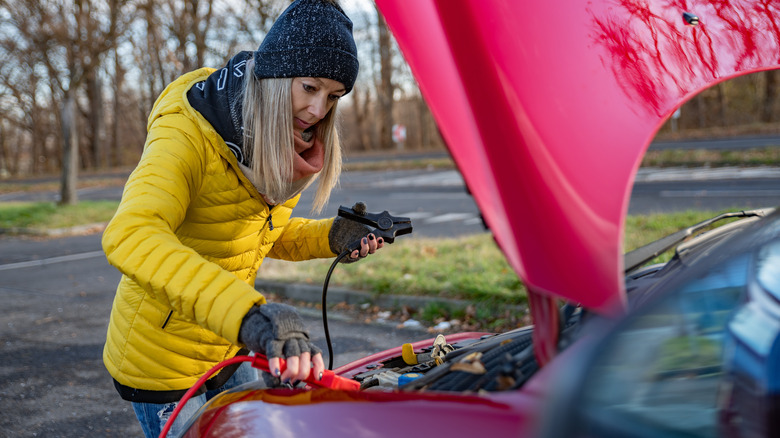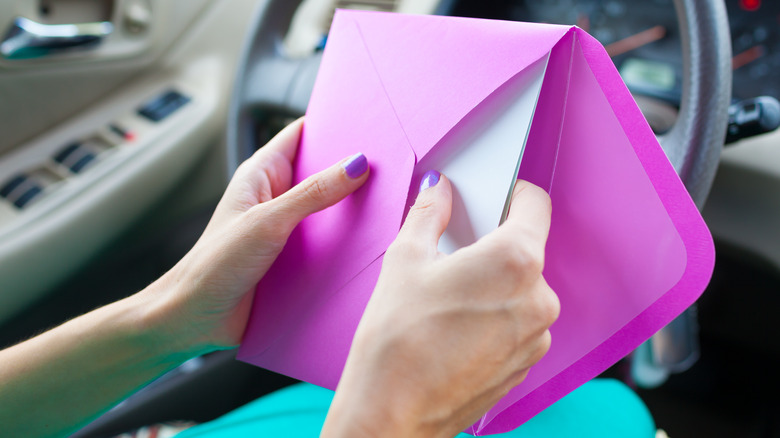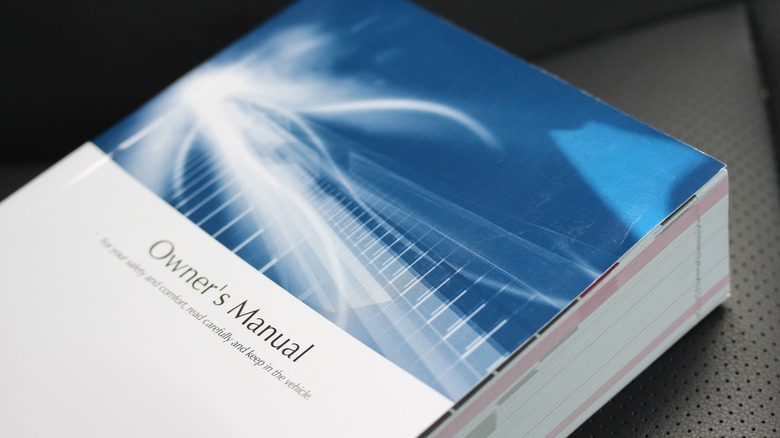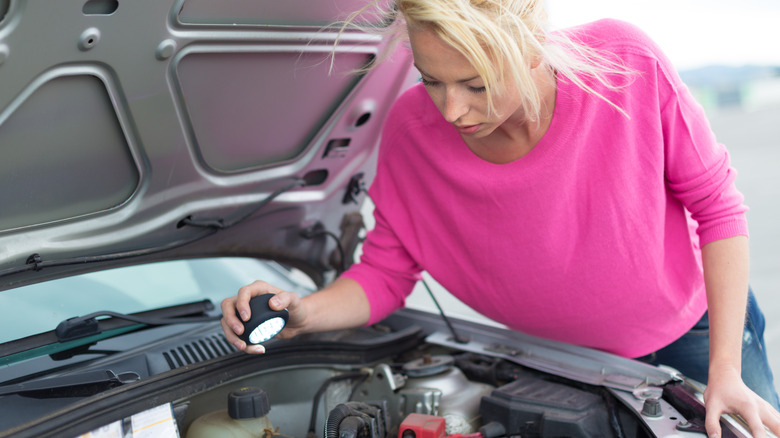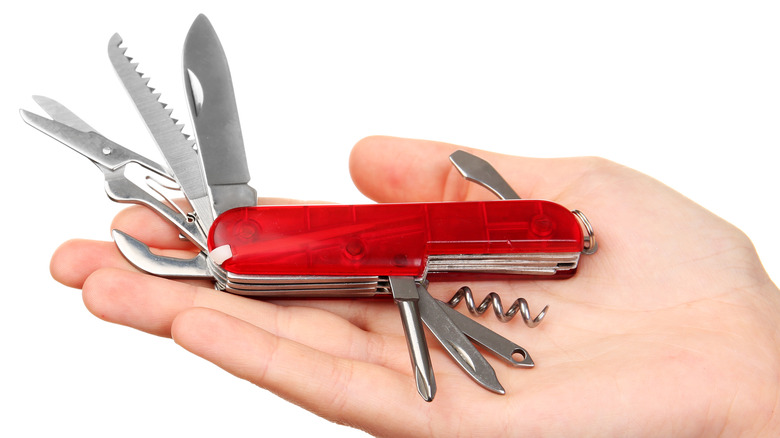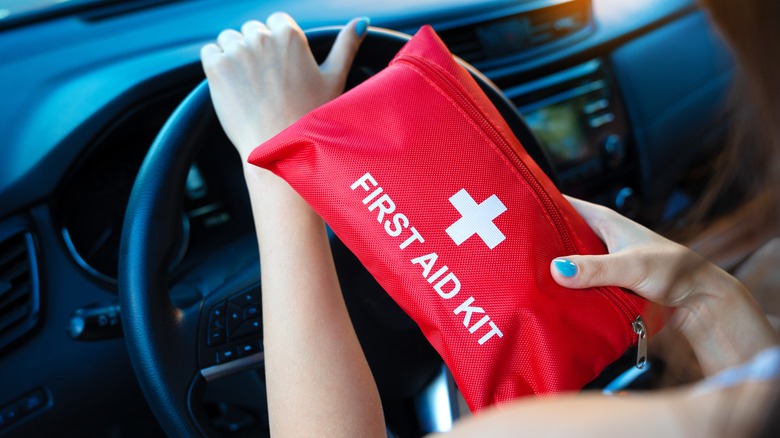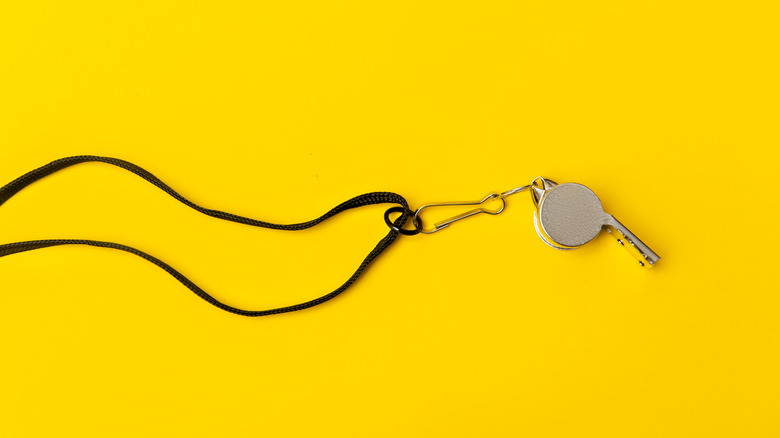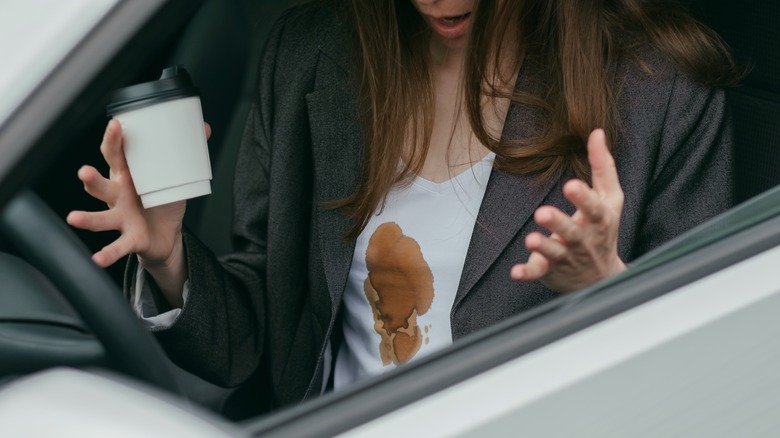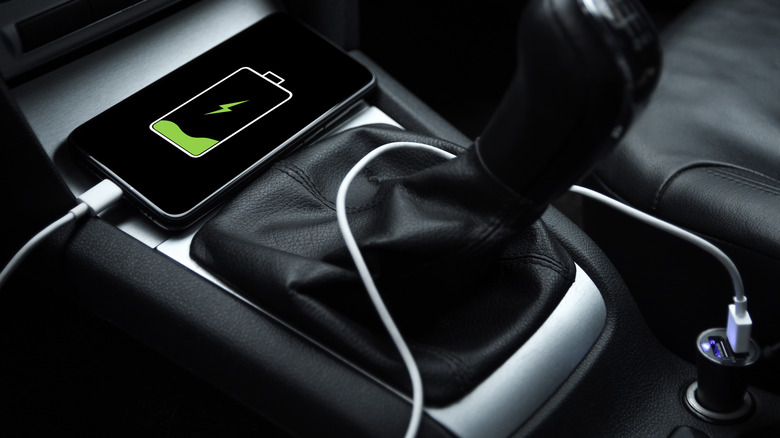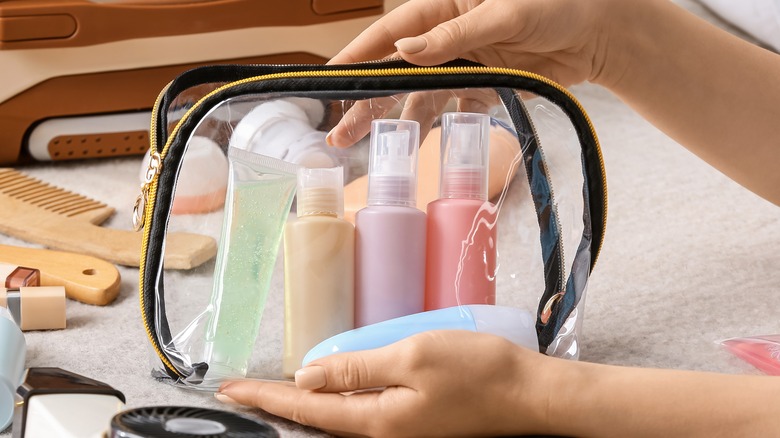What Every Woman Should Have In Her Car
A vast majority of the population is dependent on their cars to get them where they need to go. While many developed cities use walkways and public transportation to get around, people in the outskirts and suburbs rely on driving.
Additionally, as financial hardships grow, many people have had no choice but to live out of their cars in order to cut down on expenses. Regardless of why one owns a car, it's hard to bypass the fact that owning or leasing a car is a privilege that a great deal still can't say they have — one would do well to reflect on this while they're huffing their way through lunch-hour traffic.
It's also worth noting just how much time one spends in their car. One study found that Americans spend a yearly total of 18 days in their car, with an average of about eight hours a week, according to OnePoll (via The Car Connection). With so much time spent in our vehicles, it's important that we take proactive steps in stocking our cars with necessities that we may need on the road.
Jumper cables
Even the most amateur drivers know that the car battery is one of the most vital parts of a vehicle. With the engine as the heart, the car battery is the breath — and one cannot operate without the other. As much as car owners wish to keep their batteries operating forever, there are some factors beyond our control that contribute to the inevitable wear and tear of the battery.
For those exposed to intense winters, be aware that cold weather can easily shorten a battery's life over time (via Chapel Hill Tire Car Care). Human errors like leaving a car light on can also drain a battery overnight and prevent you from getting to work on time the next morning. So, it's important to keep jumper cables in your car to jumpstart the battery back to life just in case your battery dies.
To jumpstart your car, start by facing both vehicles toward each other and make sure the working car is turned off. Connect one red cable clamp to the positive post on the dead battery and then connect the other end of the red cable to the positive post on the live battery. Connect one black cable clamp to the negative post on the live battery but attach the last black clamp to an unpainted metal surface of the car with the dead battery in order to prevent fires. Switch on the working car and this will jumpstart the car with the dead battery (via Urgently).
Important documents
There are important documents that every driver must carry by law such as car registration and insurance, but there are also documents that drivers may want to carry for practical reasons like medical cards and a list of emergency contacts. Having a folder in your glove compartment with this essential paperwork is a good idea in case of unforeseen situations.
Not only is it imperative to always travel with updated car registration and insurance, but it's also illegal not to do so. We all hope that we're never involved in a fender-bender, but on the chance we are, insurance will be the "middle person" that protects and assists us going forward. Car and bodily injury can be expensive, and every responsible driver will want to ensure they protect themselves.
In the event that an accident requires serious attention, medics and other parties involved find it useful for a driver to keep a medical card on hand, which will inform the first responders of any known allergies, conditions, or other important information they should know before administering medical attention. While many find it useful to store emergency contacts on their phones, it's worthy to handwrite them down as well, in the event that medics and authorities can't access your phone. Leading auto insurance agency Nationwide suggests keeping all of these essential documents in your glove compartment where they're easily stored and easily accessible.
Owner's manual
At some point, one may find themselves driving as normal, when suddenly, a symbol on their dashboard lights up in an alarming red, orange, or yellow. These colors are typically associated with danger, caution, and warning, which can send the unsuspecting car owner into a frenzy if they're unaware of its meaning. Cars speak to us through these symbols and indicate a range of issues that need our attention. According to Nationwide, some of the most common dashboard symbols indicate low gas, low tire pressure, engine temperature changes, and brake system issues.
It's important to understand the language of your car, and while most of these symbols are universally recognized and understood, you may find yourself staring at one that you can't seem to decipher its meaning; this is where the owner's manual handbook comes in handy. While tedious to read, it's important to carry this in your car, as there are many benefits to having this pocket of knowledge handy that extend beyond understanding dashboard symbols.
Flashlight
Flashlights are a great item to store in your car in case of an emergency. Many things can occur while driving at night. In the unfortunate event that one finds themselves stranded in the dark of the evening, keeping a flashlight handy will serve multiple benefits.
Ideally, a standard battery-operated flashlight will assist in most situations. For those looking to add a flashlight in their car, it's important not to leave it in direct sunlight as exposure to extreme heat can cause damage such as batter leakage (via Energizer). Instead, try storing the flashlight somewhere where the temperature doesn't get too hot.
You can choose between battery-operated car flashlights or you may prefer rechargeable flashlights for better long-term life. Rechargeable flashlights come with USB ports that can easily be charged in your car or at home, the ability to run for long periods of time, and a hands-free option that illuminates headlamps or flashlights (via Battery Junction).
Pocket knife
There are several valid reasons why one should carry a pocket knife or a multi-tool Swiss Army Knife in their car. From fixing minor car repairs to breaking a window in an emergency situation, a pocket knife can be your best friend in an unforeseen crisis.
While one should hope to never have to use it, a great use for a pocket knife is in the event of a collision as some may find it's easier to cut their seat belt or any other type of restraints to free themselves from potential harm. If one chooses to store a pocket knife in their car, it's important to note that each state carries its own rules regarding having this in a vehicle.
For example, whether or not you're permitted to carry a knife in your car depends on the length of the knife (via Survival Freedom). Some states with zero knife-length limits include Alabama, Alaska, and Arkansas while states that do not specify any knife-length limits include New Mexico, North Carolina, and Pennsylvania.
First-aid kit
It's been well-established that a responsible driver should be proactive and as prepared as possible for any potential situation that could occur on the road. This includes being prepared for any type of injury that may occur for various reasons. In the event of a collision with bodily harm, it's best to let on-site medics attend to any wounds, as they are professionally trained. For minor injuries such as paper cuts (everyone opens their mail in their cars, right?) or small knicks that perhaps drew blood, keeping a first-aid kit nearby will come in handy.
Drivers who are on the road with their little ones may benefit from having a first-aid kit as well, as kids tend to get cranky and rowdy with their siblings in the backseat. A standard first-aid kit should work in these minor situations. The best first-aid kit for your car should include essentials such as adhesive band-aids, gauze, cotton swabs, Vaseline, antibiotic ointment, hand sanitizer, Aspirin, Ibuprofen, or other pain-relieving medication (via SureFire CRP).
Whistle
Keeping a whistle in your car is another great tool for safety. In the unfortunate event where one finds themselves in a circumstance of danger, a whistle can serve to draw attention to you and the danger at hand. Because of their sharp and abrupt high notes, keeping a whistle handy can help if you are trapped in your car during extreme weather conditions or if you're lost in a deserted area without cellphone reception. To signal that you're in danger and require help, blow three loud, short blasts into your whistle for three seconds each (via Go Time Gear).
There's also another type of whistle that can be used for safety which is known as a deer whistle. Easily clamped to the grill of the car, deer whistles assist in scaring away deer on animal-populated roads (via Progressive). Those who have had a collision with a deer know how expensive repairs can get (by the way, deer don't typically carry insurance), and taking preventative measures will assist in keeping the deer away. This type of whistle may be a good option for unforeseen emergency situations too.
Spare change of clothes
Keeping a spare change of clothes is a great way to be prepared for any number of circumstances. While many of us try to keep a decent morning schedule, too often, we're running out the door with our coffee in hand, sprinting to the car, then frantically sipping on our hot beverage while driving. One wrong sharp turn or jerk of the hand can result in the dreaded coffee spill. In this event, every on-the-go gal will thank themselves for keeping an extra pair of work clothes in their car.
Another scenario where spare clothes come in handy is in the event that you may be stranded due to car troubles. Maybe your car shut off and you're waiting for help to arrive, which may take all night. Keeping an extra fleece sweater can help to keep you warm, while rain boots and rain jackets will assist in keeping you dry during a downpour. Primal Survivor suggests keeping a spare pair of jeans, a loose shirt, warm fleece, a rain jacket or poncho, and rain boots.
Phone charger
Among every suggestion in this article, a phone charger might just be the one universal item we all carry with us, regardless of location. Mostly, everyone does the majority of their communication through their cell phones. Frequent phone use in the car isn't uncommon; from using a phone's GPS system to streaming music, it can be all too easy for a phone's battery to drain.
In the event of an emergency, one will want to be sure they have a working form of communication. Keeping a phone charger in your car will come in handy to ensure that you'll always have a full battery while you're on the road. Among some of the more popular charges are solar-powered ones that will charge your phone by using converted energy from the sun. This will come in handy for those who are stranded in a remote area with a dead car battery and don't have access to an outlet. Some solar-powered phone chargers are known to operate better than other types, and not all of them are equipped to manage every scenario (via Good Housekeeping), but with a little research, you can find the best device for your car.
Personal hygiene products
Personal hygiene requires near-constant maintenance. For drivers who are constantly on the go, keeping a kit of personal hygiene products is a great way to make sure one stays fresh and clean throughout the day. While everyone tends to leave their house prepared for wherever they're going, there's just no way to predict just how long you'll be in your car, from standstill traffic to unsuspecting detours, it's always best to be prepared to sit in the driver's seat for the long haul.
Personal hygiene products, of course, depend on the individual preference of the driver; however, there are some universal items that will come in handy. These items may include toothpaste with a portable toothbrush, moist towelettes, menstrual products such as tampons and pads, contact lens solution for those who wear contacts, and garbage bags with plastic ties for any various sanitation. While not necessary, it's always a good idea to keep other travel products on hand such as perfumes, disinfectant spray, and chewing gum.
Winter essentials
In a lot of states, the ice-cold winters are certainly no joke. Fortunately, many cars are equipped to tend to cold weather, with heating options all around the car, including seat warmers. While we may enjoy the warmth of our cars against the intense chill of winter, unfortunately, it's not something that we should always count on in an emergency situation.
In the event of an incident that may leave you without a working car, it's important to keep your body warm, especially in states where below-freezing temperatures pose a serious risk as seen following the tragic blizzard that swept western New York in December 2022 where people were trapped in their cars (via Reuters).
Some great winter-wear suggestions to keep in your car include a pair of socks, scarves, gloves or mittens, and hats (via The Washington Post). For those living in states where it's most likely to snow in the colder temperatures, keeping an extra pair of snow shoes may come in handy, in the event that you may need to exit your car.

